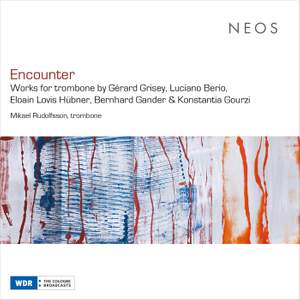"Encounter" is a multifaceted term. The English word can carry the meaning of meeting, confrontation, something unexpected, contact. Our program also bears witness to this diversity of meaning. It thrives on vital exchange, on opposition, dangers, surprises, and not least on risk. Mikael Rudolfsson has commissioned three of the pieces specially for this program- Vier kurze Stucke fur erweiterte Posaune, Messing 1 and The Encounter. They are tailor-made for him, but of course not cut into bite-size pieces. On the contrary, they challenge, push one out of one's comfort zone.
This is also true of Sequenza V, which is still spectacular nearly sixty years after its composition. Here Luciano Berio pulls out all the stops in experimental sound production.
Quite an innocuous title, Vier kurze Stucke [Four Short Pieces], is given to the adventure that Eloain Lovis Hubner prepares for both the performer and us. The instrument is literally disassembled, and "good" tone avoided throughout. All conceivable sound/tone combinations - from murky to a shrill screech - can be heard.
Bernhard Gander's Messing 1(Brass 1) speaks of an elemental encounter. Copper meets zinc, from which - alloyed to brass - brass instruments are formed. The entire piece is a true tour de force which generally goes to the limits, including in terms of tempo and dynamics. It is thus important for the performer to pace himself well so as not to run out of breath too soon.
In The Encounter,Konstantia Gourzi creates an eerie interaction full of "wonder, fear, and curiosity". The soloist is confronted via tape with an undefined sound world. He conveys changing emotional states, incorporating rhythmic breathing noises, vowels, and consonants which are articulated directly into the instrument and are to sound as if they were sung, whispered, or communicated in Morse code.
The encounter in Gerard Grisey's Solo pour deux is quite intimate. Strictly speaking, it is a monologue that takes place in the space between two unequal partners, which combine to form a hyper-instrument, doing so very directly: the clarinet merges with the trombone, and both play until their sounds are almost indistinguishable.
Mikael Rudolfsson (born 1987 in Stockholm) is the trombonist of Klangforum Wien and professor of trombone at the Music and Arts University of the City of Vienna. He has performed as a soloist on four continents and in the most important halls worldwide. His passion is for the music of our time, which manifests itself in countless world premieres, commissioned works, concepts, texts, and ideas connected to new and cutting-edge musical currents.





